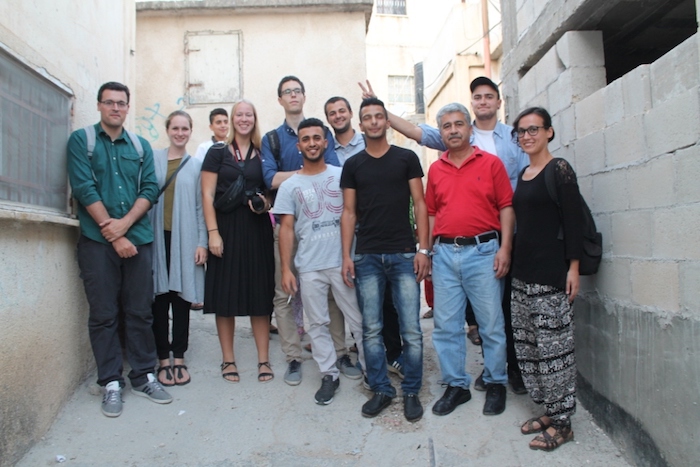
Traveling to the West Bank Through Israel: With no airport in Palestine your only option to travel into the West Bank is through Israel (or the Jordanian border, see article on Traveling to Palestine from Jordan). This can be intimidating for many people, especially with what we hear about the conflict on the news. But both Israel and Palestine are relatively small places, compared to say the U.S. or France, so travel is quick. Moreover, for all the hype you’re unlikely to encounter problems.
If you’re visiting the West Bank you’ve most likely arrived via plane in Tel Aviv (Israel) on the coast may seem far away from your ultimate destination. But in reality, the city is only a little over 70 km, or 40 miles, from Jerusalem. Your first step will usually be getting to Jerusalem. There is a train but it can run slow and you are generally better using vehicles. A cab is possible, but expensive.
Connor from the USA, 24, recounts, “The last time I was in Tel Aviv a driver offered me a lift for 250 NIS ($70 USD) for a one hour trip.” Instead take the bus for 18 NIS or a shared taxi (sherut) for around 25 NIS. Sheruts will drop you off at Damascus Gate near the old city, buses will not but you can take a cab or the rail to the gate. Damascus Gate serves as your jumping off point into the West Bank as you can find shared taxis and buses to all the main towns and cities under the control of the Palestinian Authority (PA).

Safety is most travelers primary concern when going to the West Bank from Israel. The official signs you will likely see when entering a city like Hebron or Bethlehem, which in effect warn Israelis to stay out of Palestinian areas as it is illegal under Israeli law and dangerous, will not help matters. However, keep in mind that these signs are not directed at, and largely have no bearing on, you as an international visitor.
The signs are put up by the Israelis to keep their citizens out of the autonomous regions of Palestine. The Oslo II Accord between Israel and the PA divided the West Bank into three (non-continuous) sectors, Area A under Palestinian control, Area B under joint Israeli-Palestinian control, and Area C under Israeli control. Israeli citizens cannot, under the agreement, enter Area A and the Israeli military and government warns citizens against entering Area B.
As an international visitor however, the Oslo Accords have no bearing on you. This brings us to our next point, as a visitor you’re not involved in the conflict. Most people in the area recognize this, so no matter how tense things get between the Palestinians and the Israelis, anger shouldn’t be directed toward you. One safety tip is to avoid unintentionally taking sides in the conflict.

Announcing your intention to visit, say Hebron, in your hostel in Tel Aviv is unwise, as is wearing any article of clothing, t-shirt, hat, necklace, etc. identifying you with Israel or Judaism while in Palestine. Most Israelis won’t care if you want to visit Palestine and most Palestinians could care less if you’re Jewish, this is mainly to avoid trouble with that 0.01% of people in every society who are unstable or extremists.
The only other things you’ll need to worry about if traveling to Palestine is getting ripped off by a taxi driver, which happens just as easily to travelers in cities like New York, and traveling solo as a female. Traveling alone as a woman always involves risk no matter where you all.
Cat-calling certainly happens in the West Bank as it does in many places. As a foreign woman, locals may also have different ideas about you and your values as well. That being said, most Palestinians are incredibly honorable, and traveling with a friend, on public transport, or during daylight hours can help diminish these risks.
Lastly, when entering the West Bank your taxi, shared taxi, or bus may stop at a check point. Again, as an international you shouldn’t have any trouble with this no matter how intimidating it may sound. Some guards may not even want to see your paperwork. Be friendly and honest and keep your passport and visa with you at all times and you’ll be fine.
